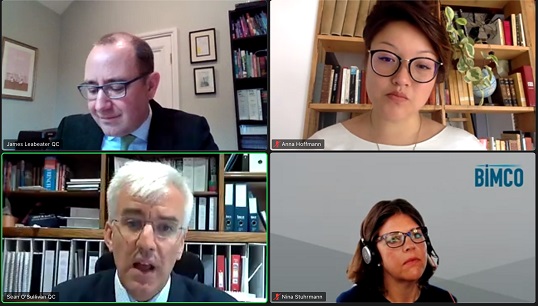
BIMCO is preparing to unveil an updated clause for shipowners and charterers on infectious diseases, detailing who is to bear what risk for time and money consequences of delays and disruption.
The clause would apply, for example, to vessels where a pandemic or serious disease prevents or delays crew change. It would also cover what happens if a master decides not to call at a certain port due to a risk of infection there.
Nina Stuhrmann of BIMCO told a panel discussion at London International Shipping Week that the present coronavirus pandemic had rendered the current Infectious Diseases Clause problematic as it never foresaw a pandemic like this one with disease variants that change frequently.
She said: 'With crew delays and crew changes, no-one knows what’s coming next. Therefore, we decided the (redrafted) clause will be general rather than deal with specific scenarios. It’s impossible to predict what the next pandemic or incidence will look like.'
The new clause will be suitable both for pandemics like novel coronavirus and endemics such as Ebola. It would also be acceptable to both shipowners and charterers and would recognise that not all diseases are a threat to life where precautions can be put in place.
The redrafted Clause is expected to be approved in November.
A major infection risk to seafarers is external parties such as stevedores coming on board a vessel, Ms Stuhrmann said. Whereas a charterer decides where a ship trades, masters and owners have the right to refuse to call at a port if there is high infection risk. 'The feedback is it should be changed, so no automatic right of refusal to call at a port.' This is because with a pandemic, infection is deemed to be everywhere.
The current clause allows owners/masters to decide on the basis of 'reasonable judgement' whether to allow a vessel to be in an affected area – with a real and significant level of danger.
James Leabeater QC of law firm 4 Pump Court outlined a number of problem areas facing the industry: owners being reluctant to call in certain countries because they do not want their crews to catch Covid-19 or ships to be quarantined; delays caused by crews catching Covid-19 and having to quarantine; vessels not being allowed to discharge or load; difficulties in carrying out crew changes; delays caused by bunker shortages when ships have difficulty entering ports.
He said while there were different interests at play, a disputes claim would be more likely to succeed if there had been an attempt at fairness. 'A real problem faced by some crews in the world is where they get their vaccinations. For example, the Philippines and now the UK, probably, are infection hot spots.' Variants worse than Delta are something charterers will take account of in advance. Owners will be keen to ensure crews gain access to vaccinations to keep vessels operating.
Disputes arise, he said, over whether vessels should be put off-hire. 'The general consensus is it’s difficult to see where Covid-19-related delays would put a vessel off-hire. The problem of faulty Covid tests was highlighted, and is a problem especially in China, the seminar heard.
Mr Leabeater said if owners wanted crews to have access to be vaccinated fully, maybe more of the risk of delays should rest with charterers.
Anna Hoffmann, barrister with 4 Pump Court, said the current definition of disease in the clause is a 'highly infectious or contagious disease that is seriously harmful to humans'. BIMCO’s principles are that a high threshold means the triggering mechanism only takes effect in instances of extreme illness and cannot be misused for commercial purposes in relation to more common viruses.
The seminar was held jointly between 4 Pump Court and BIMCO.
Follow this story
-
Equality
Diversity panel share their wishes for an inclusive maritime workforce
- News
- 21 September 2021
-
International
Universal support for an amended Maritime Labour Convention at LISW
- News
- 17 September 2021
-
Technology
Pandemic accelerates the need for improved connectivity at sea for seafarers
- News
- 16 September 2021
-
Equality
Women in transport: diversity is not a side issue, LISW summit hears
- News
- 16 September 2021
-
Environment
Ocean Rebellion protest Wakashio oil spill response outside LISW Conference
- News
- 15 September 2021
-
International
ITF: Recognise seafarers' contribution during Covid or risk labour supply shortages
- News
- 15 September 2021
-
Equality
WISTA UK: Representation of women in board positions in shipping companies has reversed
- News
- 15 September 2021
-
Technology
Tech transformation of shipping to ramp up, LISW delegates hear
- News
- 15 September 2021
-
Health and safety
Redraft of BIMCO's Infectious Diseases Clause to be unveiled
- News
- 15 September 2021
-
Environment
Minister highlights UK efforts to reach net zero in shipping at LISW headline conference
- News
- 15 September 2021
-
Environment
Time for urgent action on alternative fuels, warns LISW decarbonisation seminar
- News
- 14 September 2021
-
Nautilus news
A proud LGBT+ first for London International Shipping Week
- News
- 14 September 2021
-
Welfare
Connectivity key to improving seafarer welfare, say maritime charity chiefs
- News
- 14 September 2021
-
International
Former MI6 chief: geopolitical tension now a major threat to maritime industry
- News
- 13 September 2021
Tags
More articles
Time for urgent action on alternative fuels, warns LISW decarbonisation seminar
The shipping industry needs to start pilot projects for alternative fuels right away if it is to stand any chance of meeting its decarbonisation targets, according to a London International Shipping Week event
Minister highlights UK efforts to reach net zero in shipping at LISW headline conference
The UK will bring forward ambitious shipping initiatives at the upcoming UN Climate Change Conference (COP26), Anne-Marie Trevelyan the Minister for Business, Energy and Clean Growth, told delegates at London International Shipping Week (LISW).
